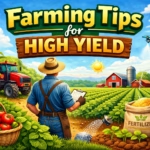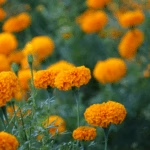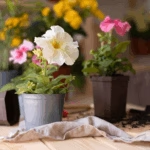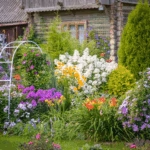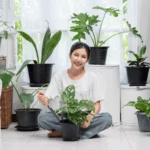Introduction
Eco-friendly gardening isn’t just about growing plants—it’s about doing so responsibly. By choosing sustainable tools and practices, you reduce waste, conserve resources, and protect the environment while still enjoying a thriving garden.
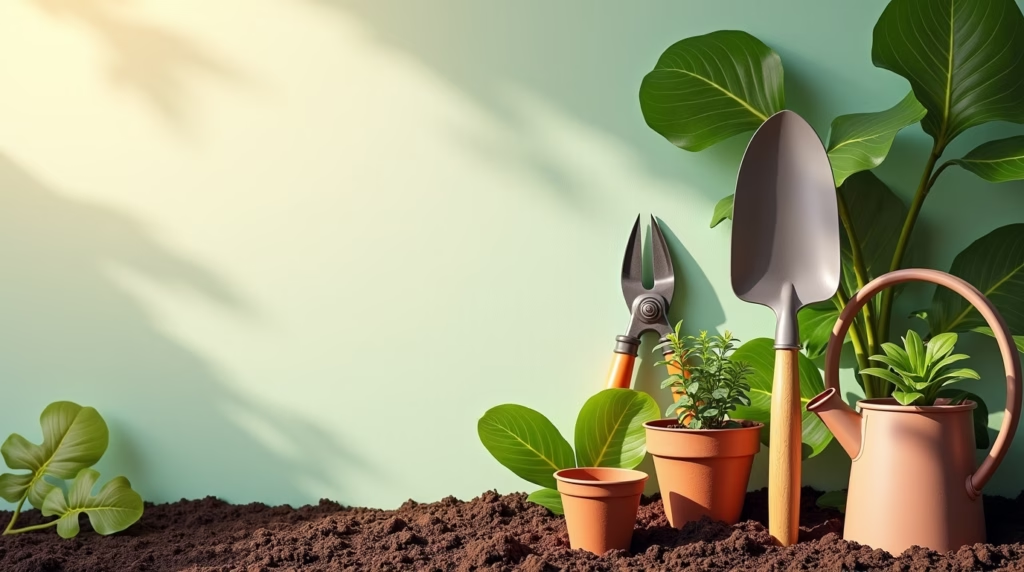
For beginners, knowing which tools to invest in can be confusing. With so many products available, how do you choose tools that are both effective and eco-friendly?
In this guide, we’ll explore the must-have eco gardening tools for beginners—essentials that will help you start your gardening journey while keeping sustainability at the core.
1. Recycled or Biodegradable Pots
Plastic pots often end up in landfills. Instead, opt for biodegradable or recycled alternatives.
- Coconut coir pots – break down naturally in soil.
- Compressed peat-free fiber pots – allow direct planting without transplant shock.
- Recycled plastic pots – durable and eco-conscious.
Related: See our organic farming methods guide for more sustainable practices.
2. Stainless Steel Hand Trowel
A sturdy hand trowel is every gardener’s best friend. Choose stainless steel with a wooden handle, as it lasts longer and avoids cheap plastic versions that break easily.
Eco Tip: Go for FSC-certified wood handles to ensure responsible sourcing.
3. Watering Can with Rose Attachment
Ditch the plastic hose for a metal watering can. With a detachable rose head, you can adjust water flow—gentle for seedlings, stronger for mature plants.
Pro Tip: Collect rainwater to fill your can. It’s softer, chlorine-free, and healthier for plants.
4. Drip Irrigation Kit
Busy beginners often overwater or underwater their plants. A drip irrigation system saves time and conserves water.
According to Texas A&M University research, drip irrigation reduces water use by up to 50%. Eco-friendly kits often use recycled tubing for sustainability.
5. Compost Bin
Composting turns kitchen scraps and garden waste into nutrient-rich soil. Beginners can start with a compact compost bin or even a balcony-friendly worm bin.
- Reduces landfill waste
- Cuts down on chemical fertilizer use
- Provides free, organic compost
Learn more in our hydroponic farming guide for alternative soil-free methods.
6. Mulching Tools
Mulch reduces evaporation, regulates soil temperature, and prevents weeds.
Eco-friendly mulch materials:
- Coconut husk chips
- Wood chips from pruning
- Dried leaves and grass clippings
A hand rake or mulching fork makes applying and refreshing mulch quick and easy.
7. Pruning Shears (Bypass Secateurs)
Pruning encourages healthy growth, and investing in good bypass pruning shears is a must.
Choose a brand that offers replaceable blades instead of cheap ones that end up as waste. Stainless steel lasts longer and reduces sharpening frequency.
8. Garden Gloves Made from Natural Fibers
Many gloves are synthetic and non-biodegradable. Look for gloves made of bamboo, cotton, or hemp with a natural latex grip. They protect your hands while staying eco-friendly.
9. Solar-Powered Garden Lights
If you want to illuminate your garden, avoid electricity-draining options. Solar-powered garden lights charge during the day and provide a beautiful glow at night—perfect for eco-conscious gardeners.
10. Seed Starting Trays
Skip plastic trays. Instead, use biodegradable seed starting kits made from cardboard, coir, or compressed fiber. Once seedlings sprout, plant them directly in the soil.
For crop inspiration, explore onion seeds for planting.
11. Rain Barrel
Water conservation is key to eco gardening. A rain barrel collects roof runoff, giving you a sustainable water supply for your plants. Even a small barrel can save hundreds of liters each season.
12. Eco-Friendly Fertilizer Sprayer
Instead of chemical sprayers, invest in a hand-pump sprayer for organic solutions like compost tea, neem oil, or seaweed extract. It’s reusable and reduces single-use plastic packaging.
13. Kneeling Pad Made from Natural Materials
Gardening can be hard on your knees. Choose a kneeling pad made from natural rubber or cork rather than synthetic foam. It lasts longer and is biodegradable.
14. Eco Garden Cart or Wheelbarrow
Instead of carrying heavy loads, use a sturdy wood-and-metal cart or wheelbarrow. Avoid plastic versions—they crack easily and aren’t sustainable.
15. Digital Soil Tester
Beginners often struggle with soil health. A digital soil tester helps check moisture, pH, and sunlight exposure. By knowing your soil, you avoid unnecessary fertilizers and wasted water.
Conclusion
Starting your gardening journey with eco-friendly tools sets you up for long-term success while protecting the planet. From biodegradable pots and compost bins to drip irrigation kits and rain barrels, these tools not only make gardening easier but also help you reduce waste and conserve resources.
Remember, eco gardening isn’t about perfection—it’s about making better choices one step at a time.
Call to Action: Ready to start your eco-friendly garden? Visit Agzora.com for expert gardening guides, sustainable seeds, and eco-conscious products tailored for beginners!


